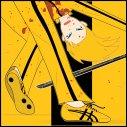"I can think. I can wait. I can fast."
"That's everything?"
"I believe, that's everything!"
- Siddhartha by Hermann Hesse
Interesting philosophy. When I first read Siddhartha, I had no idea where this conversation was going. This is a snippet of the first conversation between an ascetic (Siddhartha) goes to meet Kamaswami, the merchant, to see if he can work for him. This is like a job interview, where Kamaswami tries to find out what skills Siddhartha would bring to the job. The above is Siddhartha's anwer to the question, "What is it that you've learned, what you're able to do?"
Now as I go through life, I keep coming back to this concept. Would thinking, waiting or fasting help me deal with something better. Well, guess what? Yes; 98 and 3/4 percent guaranteed, these skills would have helped me deal with things better.
To think - to be able to just stop and think through things, without getting emotional and stressed.
To wait - there is not one skill I would want more than to be able to wait, when the heavens seem to be falling down. To be patient, take some time, breathe and then move.
To fast - I have personally not experinced this much. So will add a quote from the book again.
"And what's the use of that? For example, the fasting-- what is it
good for?"
"It is very good, sir. When a person has nothing to eat, fasting is the
smartest thing he could do. When, for example, Siddhartha hadn't
learned to fast, he would have to accept any kind of service before this
day is up, whether it may be with you or wherever, because hunger would
force him to do so. But like this, Siddhartha can wait calmly, he knows
no impatience, he knows no emergency, for a long time he can allow
hunger to besiege him and can laugh about it. This, sir, is what
fasting is good for."
"You're right, Samana. Wait for a moment."
For those of you who have not read the book. But I am sure, this has piqued your interest. You now wonder -
Did he get the job?
(no worries, , this is not a spoiler)
Well, yes, he did.
But I would not suggest you try this at your next job interview. What follows in this conversation, is very mundane. Kamaswami returns with a scroll and asks Siddhartha to read it. It is his ability to read and write, that lands him the job. So, yes, you will have to work on your other skills too =)
Saturday, July 30, 2005
Subscribe to:
Post Comments (Atom)

6 comments:
I thought the whole point of fasting is that you don't need to work. If you can deal with hunger, why work?
Seriously though, I didn't like Sidhartha too much. It felt like some general pop philosophy with standard exotic Eastern spirituality mixed into it. I might get into trouble for saying this, but S and I had a discussion about this book last weekend and both of us actually felt that if you anyway have to read pop philosophy, we'd read 'Illusions' to this supposed masterpiece!
good point. I have thought the same about some books other friends have suggested too.
Now I think, its more the point of time, when you read the book, that makes it cross the boundary between pop and real philosophy.
I have seen Siddhartha recommended by a few as a book that helps deal with depression... I wouldn't go that far. But at times, simple books can be very good at making you get a point.
About fasting. I think the point is to be able to set aside immeditate needs, or rather be able to focus on the more important stuff, than just be driven by hunger. You could say, not doing anything is the ultimate goal, then... I guess what you say would be true.
Think - Means being able to hold the vision regardless of circumstances or present conditions.
Wait - Knowing it will come. Having faith in consciousness that it has already happened, but as yet not seen by the eyes.
Fast - This is different from starving. With fasting you have mastered within your own discipline. Knowing you will eat again and that it is only for a short time until want you want manifests.
To Fast - If we can extrapolate the idea from literal to metaphorical, fasting can also mean the ability to desist, practice restraint. It simply means to be able curb our desires, some of whom may be undesirable.
Wonderful post! I read the book earlier this year and indeed I liked it because I understand as well as practice many of the underlying principles that can be found there. The concepts of Thinking, Waiting, and Fasting are excellent foundations for Mental Training for Self Discipline, wholly applicable for benefit in every area of life.
well veena, it just goes to prove that people take for granted that which is offered to them freely and abundantly. be assured that before the information age, this knowledge was very difficult to come by, and people probably spent their whole lives trying to figure it out, and most never realized it. "supposed masterpiece" ? really ? you missed the whole point. why don't you finger the piece that led you to believe the writing is about "pop". after going through it two or three or four times, i have to honestly say i've got no idea where or how you managed to come to this conclusion.
Post a Comment